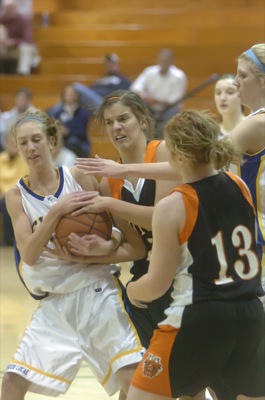Friday, February 9th, 2007
Local schools soon will see Value Added program
By Janie Southard

Photo by Janie Southard/The Daily Standard
Elise Elston, a seventh-grader at Celina Middle School, catches up on some reading in the school library. Reading is a subject area included in the state's new Value Added program.
WAPAKONETA - Educating everyone takes everyone, said Jim Mahoney, executive director of Battelle for Kids in Columbus, at the recent Mercer/ Auglaize school boards annual dinner meeting.
Mahoney is the acknowledged guru for the new Value Added (VA) initiative, which is a proposed state enhancement to the federal No Child Left Behind act (NCLB) that is due for reauthorization this year.
VA also will be one of the indicators on the 2007-08 school district report cards, which are compiled annually by the Ohio Department of Education. However, the state has yet to determine how this information will be used.
By means of standardized tests, NCLB measures a student's performance at an isolated moment of the school year. Mahoney pointed out there is a relationship between average income and student achievement on these tests in terms of parents' perspective of education, available time and resources.
Value Added measures how much a student has gained over a period of time based on where he begins. Basically, it shows a student's educational growth from one year to the next.
"Learning can and ought to be measured," Mahoney told the group of about 70 area board members and district superintendents at last week's annual meeting. "Value Added is more fair than holding teachers accountable for moving all their students from wherever the child begins to a predefined end point."
Mahoney supported the fact that there is some useful information on state test scores, but said they don't give a good account of individual growth, which is what the new VA system is designed to do.
Ohio's VA efforts began in 2002 with Battelle's Project SOAR (Schools' Online Assessment Reports) of which Fort Recovery school district has been a pilot school for the past two years.
"The state is only going to compute value for math and reading. One of the real advantages to us being a SOAR district is that we'll also calculate our scores for science and social studies," Fort Recovery Superintendent David Riel told The Daily Standard this week.
As well, the district is working with the high school students where as the new state program will deal only with third- through eighth-graders.
"Being a SOAR school allows us to know what other SOAR schools are doing and where we rank. If we're not doing well in fifth-grade math, we can look at those schools who are doing well and discover what we need to learn," he said, but he sees Value Added as more than just rating and ranking.
It's a collaborative effort where schools are not trying to beat each other but rather trying to learn from each other, he pointed out.
Pat Niekamp, superintendent at the Auglaize County Educational Service Center and the host of this year's dinner meeting, weighed in on another facet of Value Added, that of how to attain sufficient progress for gifted students.
"A dilemma in the country's education is that most of what is focused on is minimum proficiencies. This is excellent; but it should never be the only thing in focus," he said. "Value Added has real importance for our higher (achieving) kids. We need to figure how far those kids go as well. We can't get them ready in engineering, science and math with just measuring minimum proficiencies."
Celina Superintendent Matt Miller said he sees the VA program as a "great equalizer" for his diverse district as all city districts are.
"Value Added will help our district as a whole see growth in students who haven't yet passed the proficiency/achievement tests. But it's going to be tough for some (area) districts to show consistent growth because of the large number of high level students," Miller observed.
He added not all students can pass the standardized tests. "But if we can show one year's growth then we know those students are learning," he said.
Overall, Superintendent Riel accepts the state's testing models in achievement but with some provisos.
"You can weigh a cow every day but that won't increase its weight. Just like testing, we can test every day but that won't increase learning," Riel said.


